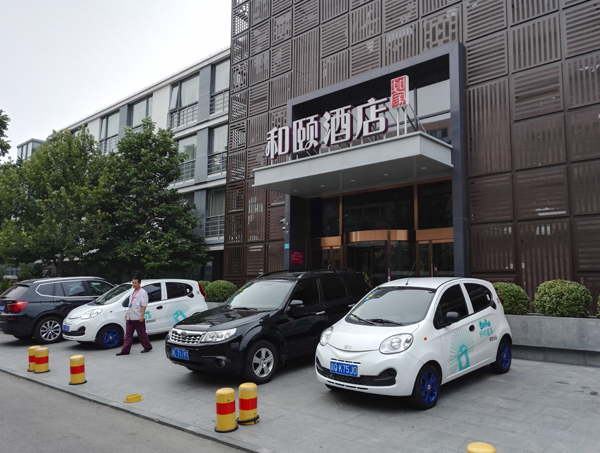 |
|
Two rental cars outside a Homeinns hotel in Beijing. Beijing Shouqi Group and Homeinns Co Ltd entered strategic partnership on Aug 11 in Beijing to increase the number of car pickup and return outlets in the hotel chain's network. Hao Yan / China Daily |
With cities across China putting restrictions on new car purchases, hire sector is expecting a bright future
Chinese car rental companies are accelerating expansion of their fleets in tier-two and tier-three cities, in expectation of gaining a larger share of the rapidly evolving mobility market over the next five years.
Beijing Shouqi Group and Homeinns Co Ltd entered a strategic partnership on Aug 11 in Beijing to increase the number of car pickup and return outlets in the hotel chain's network, as the two companies' combined network would cover not only tier-one cities but also tier-two and tier-three cities, according to the companies' news release.
Shouqi Car Rental covers 66 cities with a network of nearly 500 locations, while Homeinns operates nearly 3,000 hotels in 355 Chinese cities.
Wei Dong, chief operating officer of Shouqi Car Rental and CEO of Shouqi Limousine and Chauffeur, said: "Shouqi Limousine and Chauffeur will expand to 40 cities by the end of this year, from its current 22 cities."
Both Beijing Shouqi and Homeinns are controled by the Beijing Tourism Group, after its Shanghai Stock Exchange-listed hotel arm BTG Hotel (Group) Co Ltd took over the hotel company for 11 billion yuan ($1.66 billion) in December.
Zhang Junyi, a partner with Roland Berger Strategy Consultants Greater China, told China Daily that car rental companies are seeking higher profitability through varied approaches including network expansion.
"A car rental company may benefit from a larger network which attracts more customers," he said. "Some could make more money from larger fleets, while some may save costs through close cooperation with car manufacturers and a lower procurement price."
Roland Berger Strategy Consultants foresee stronger growth in Chinese customers' spending on car hiring. It expects car rental revenue growth to accelerate in the 0next five years to 65.7 billion yuan from 50.7 billion yuan in 2015, a 29.7 percent increase, owing to an expected surge in business rentals.
Car Inc, China's largest car rental company by fleet scale, said in a written reply that as of March it had expanded its network to 74 major cities covering all provinces with 739 directly operated service locations.
The company believes the Chinese car hiring market is in an early stage where it is developing slowly and with limited penetration. But it said a 27 percent compound average growth rate would be possible by 2018.
Car Inc's net profit more than tripled to 1.4 billion yuan last year from 436 million yuan in 2014.
Fleet expansion
Zhang sees the size of the fleets as one of the critical factors, together with fleet management and operations.
"New car registration is restricted in many large cities," he said. "The car rental or hailing service companies are eager to take more bites out of the registered vehicles, because of the limited supplies.
"The players who fall behind may not be able to catch up to the leaders, so the large companies are trying to take in as many cars as they can."
Car Inc had enlarged its fleet from 63,522 units in 2014 to 88,853 by March, and has been buying new vehicles in cities that restrict car purchases and in places that might take similar actions.
The company believes the cars bought in advance have secured the supply of core resources - registration plates - and resulted in its dominant position.
The New York-listed eHi Car Services Ltd claimed the No 2 spot as largest by revenue and reported its average available fleet size for car rentals had increased by 62.8 percent year-on-year to 32,007 vehicles for the first quarter of 2016, up from 19,659 vehicles for the first quarter of 2015.
Beijing Shouqi is also planning fleet expansion this year, with more than 10,000 new cars to be added for both its chauffeured car hailing and car sharing business nationwide. The transportation service provider's affiliate mobility service providers - Shouqi Car Rental, Shouqi Limousine and Chauffeur, and GoFun new energy car sharing - are operating China's third largest fleet of 29,500 vehicles.
Flexible fleets
Experiencing the disruption brought to the mobility market by on-demand chauffeured car hailing services, car rental companies are progressively making changes to fit customers' demands to seize more market share.
Beijing Shouqi is making dynamic adjustments between the businesses of rental and on-line hailing, but mainly in fleets outside Beijing, according to Wei.
"The car fleets outside Beijing are shared between Shouqi Car Rental and Shouqi Limousine and Chauffeur," he said. "The sharing mode generates synergy and boosts growth in both rental and on-line hailing businesses. We are bullish about the future of the mobility market, and we are getting well prepared."
Car Inc provided its affiliate, Shenzhou Zhuanche, with 19,883 units of long-term leasing vehicles for online chauffeured car hailing services, together with short-term leasing cars for peak-time operations.
Sharing the fleets between the rental and chauffeured businesses boosted the fleet's utilization rate to 64.2 percent in the first three months of this year. The more flexible management also generated significant synergy and locked in long-term stable revenue, according to the company.
The Roland Berger research report released in April said the annual revenue of the mobility market may reach 1.1 trillion yuan by 2020, about double last year's 563 billion yuan. The majority of that growth would be contributed by online chauffeured car hailing services, the report said.
Compared with the projected 127 percent annual revenue growth rate of online chauffeured car hailing services, the car hiring's 29.7 percent revenue increase will not surprise the market, nor will the possible 34.5 percent decrease in daily orders expected in 2020, according to Roland Berger.
